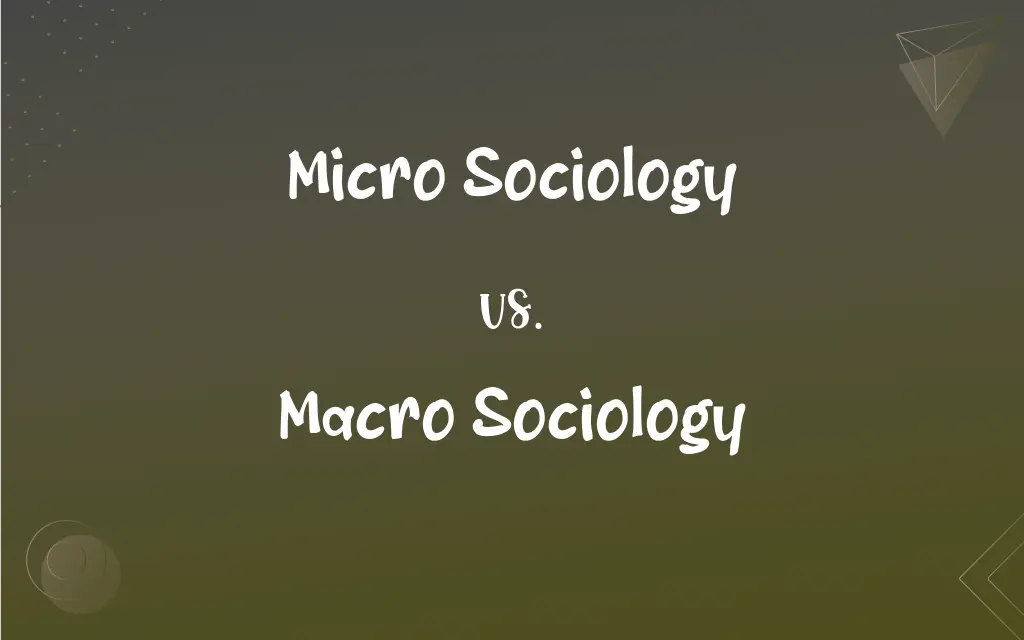Micro Sociology vs. Macro Sociology: What's the Difference?
Edited by Aimie Carlson || By Janet White || Published on March 3, 2024
Microsociology focuses on individual and small group interactions, while macrosociology studies larger societal structures and processes.

Key Differences
Microsociology examines the behaviors, interactions, and experiences of individuals or small groups. Macrosociology, conversely, analyzes broader social dynamics, including societal structures, institutions, and large-scale social processes.
The scope of microsociology includes everyday life interactions, social roles, and interpersonal relationships. In contrast, macrosociology addresses issues like social stratification, systems of governance, and economic systems.
Microsociology often employs qualitative methods like observations and interviews to understand personal experiences. Macrosociology typically utilizes quantitative methods, including statistical analysis and surveys, to explore patterns and trends on a larger scale.
Theories in microsociology include symbolic interactionism and social constructionism, focusing on meanings and perceptions. Macrosociology encompasses theories like functionalism and conflict theory, which explain social structures and power dynamics.
Microsociology is essential for understanding individual and group behavior within societies. Conversely, macrosociology offers insights into how societal forces shape individual and group experiences.
ADVERTISEMENT
Comparison Chart
Focus Area
Individual and small group interactions
Large societal structures and processes
Scope of Study
Everyday life, interpersonal relationships
Social stratification, systems of governance
Methodological Approach
Qualitative methods like observations
Quantitative methods like statistical analysis
Theoretical Frameworks
Symbolic interactionism, social constructionism
Functionalism, conflict theory
Purpose
Understanding personal experiences and behaviors
Exploring societal patterns, trends, and structures
ADVERTISEMENT
Micro Sociology and Macro Sociology Definitions
Micro Sociology
Examination of personal and direct social relationships.
Microsociology explores friendships and intimate relationships.
Macro Sociology
Exploration of societal patterns and trends.
Macrosociology can help understand the causes of social inequality.
Micro Sociology
Inquiry into individual experiences and perceptions.
Microsociology studies how personal identity is formed through social interactions.
Macro Sociology
Examination of social systems and their impact on individuals.
Macrosociology looks at how cultural values shape individual behavior.
Micro Sociology
Focus on small-scale social phenomena.
Microsociology looks at the dynamics within a family.
Macro Sociology
Analysis of societal-wide processes and institutions.
In macrosociology, the focus might be on the role of education in social stratification.
Micro Sociology
Study of individual social interactions.
Microsociology can explain how people behave in a group setting.
Macro Sociology
Investigation of the relationships between societal institutions.
Macrosociology studies how government policies affect societal norms.
Micro Sociology
Analysis of everyday human social activities.
In microsociology, researchers might observe how people communicate in a café.
Macro Sociology
Study of large-scale social structures.
Macrosociology examines the impact of economic systems on society.
FAQs
Does macrosociology include the study of governments?
Yes, it includes the analysis of political systems and governance.
What methods are typically used in microsociology?
Qualitative methods like in-depth interviews and participant observations.
What does microsociology primarily study?
It studies individual and small group interactions and behaviors.
Can microsociology explain societal trends?
It explains trends from the perspective of individual and group behaviors.
What is the main focus of macrosociology?
It focuses on larger societal structures, processes, and institutions.
Are microsociological studies always small in scale?
They focus on small-scale phenomena but can have broader implications.
How does microsociology contribute to understanding society?
By providing insights into how individual behaviors shape social dynamics.
Can macrosociology study individual behaviors?
It can, but within the context of larger social systems and structures.
How does macrosociology view social change?
It examines social change through the lens of large-scale societal shifts.
Do microsociologists study family dynamics?
Yes, family interactions are a key area of study in microsociology.
What societal aspects does macrosociology help to understand?
It helps understand how large-scale forces and institutions impact society.
Can microsociology be applied to workplace studies?
Yes, it's used to study interpersonal dynamics in workplace settings.
Is conflict theory part of macrosociology?
Yes, conflict theory is a macrosociological perspective on social power dynamics.
What research methods are common in macrosociology?
Quantitative methods, including surveys and statistical data analysis.
Is symbolic interactionism a microsociological theory?
Yes, it's a key microsociological perspective focusing on interpersonal interactions.
Can microsociology inform public policy?
Yes, by providing insights into individual and community needs and behaviors.
How do microsociology and macrosociology complement each other?
Together, they provide a more comprehensive understanding of society at all levels.
Are social movements studied in macrosociology?
Yes, social movements are a key area of focus in macrosociological studies.
Does macrosociology examine economic systems?
Yes, it looks at how economic structures affect societal organization.
Does macrosociology have implications for global studies?
Absolutely, it's crucial for understanding global social patterns and issues.
About Author
Written by
Janet WhiteJanet White has been an esteemed writer and blogger for Difference Wiki. Holding a Master's degree in Science and Medical Journalism from the prestigious Boston University, she has consistently demonstrated her expertise and passion for her field. When she's not immersed in her work, Janet relishes her time exercising, delving into a good book, and cherishing moments with friends and family.
Edited by
Aimie CarlsonAimie Carlson, holding a master's degree in English literature, is a fervent English language enthusiast. She lends her writing talents to Difference Wiki, a prominent website that specializes in comparisons, offering readers insightful analyses that both captivate and inform.
































































